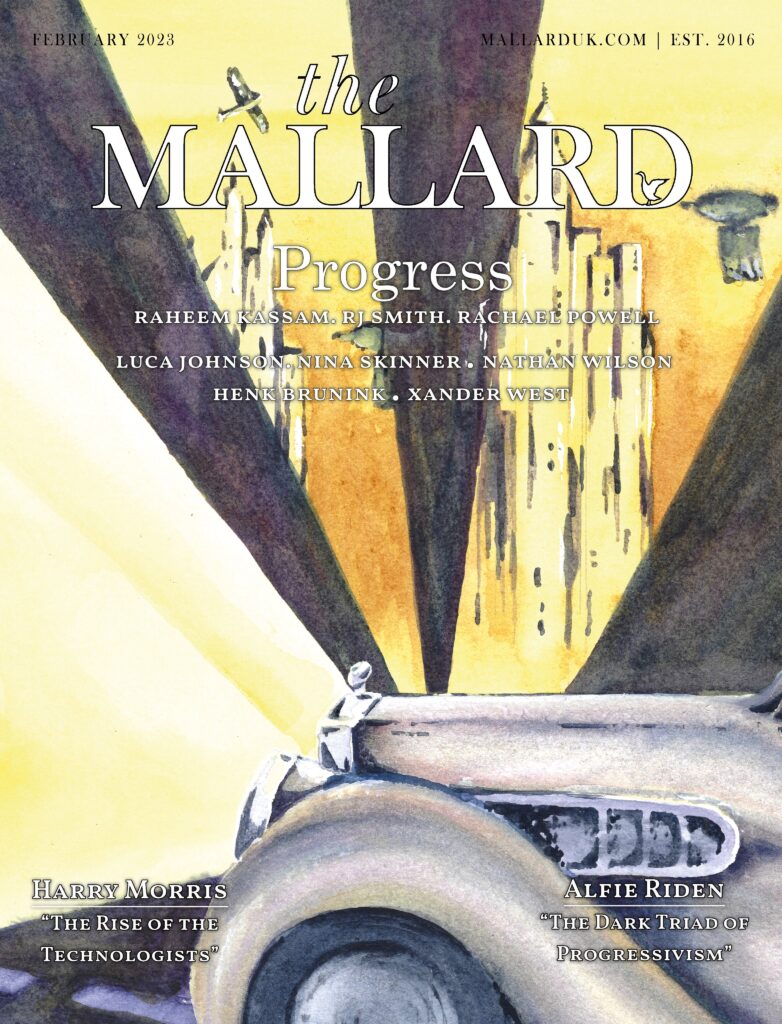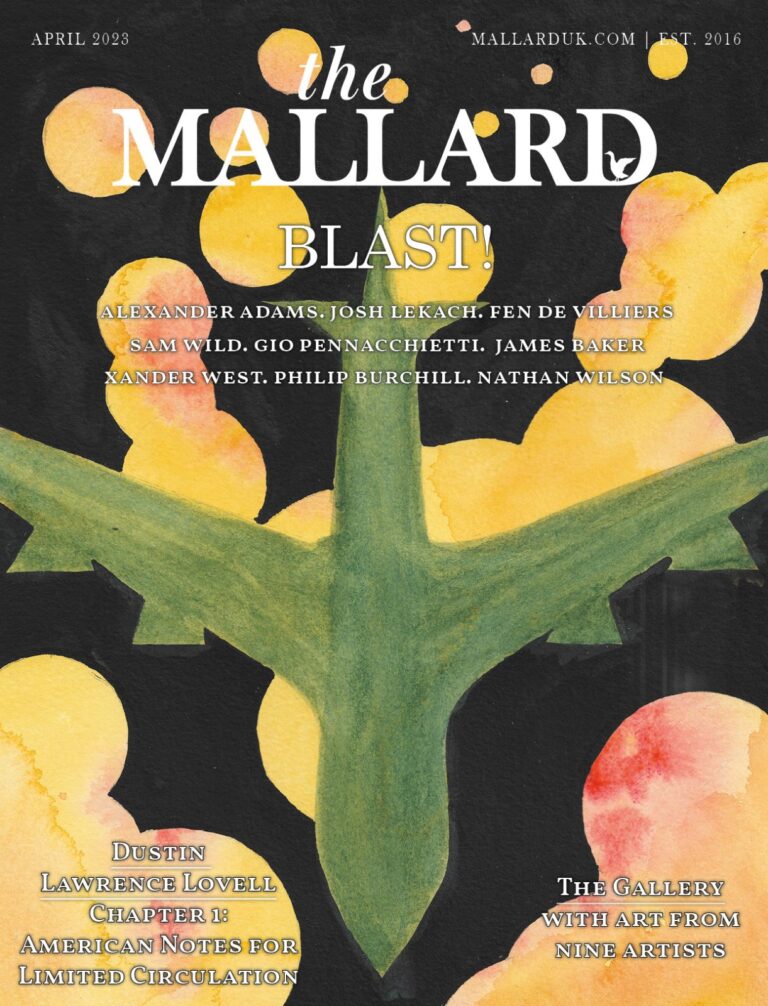Let us ponder that reassertion of artistic conservatism after the First World War for a moment. Some readers might welcome that as they read it, but what if Lewis and the Vorticists were right? What if Victorian aesthetics was an exhausted force by 1914? One only needs to consider how interchangeable the Victorian and Edwardian periods are in popular memory. Another World War and its even greater trauma later, the conservative establishment of the 1950s across British life was utterly brittle. The modern Left then began its grand project of sweeping all of it aside to little resistance from the 1960s onwards. The tired force before the World Wars suffered greatly during its course only to be killed by its ungrateful offspring.
Vorticism opposed the tradition of its time because it indeed was an exhausted one. It did not wish to destroy the world or what was prior, just transfer its energy and vigour from a point of status into bold new expressions of meaning. In their words, “the nearest thing in England to a great traditional French artist, is a great revolutionary English one.” Their vision of progress was one of creation over contentment since no force can make the world stop in one exact state of being. Refining one tradition forever is pointless if there are forces hacking away at its foundations. New traditions must develop to prevent the world falling apart under the weight of self-criticism.
Vorticism was an unapologetically ferocious formative stage of a Modernist tradition which has only ‘progressed’ through incorrect associations with its counterpart on the Left. Given its youth and combativeness, it almost had to court offence from the intensity of the energy it discharged. I think I have conveyed the exciting potential of it to have snatched the course of modernity away from its present trajectory towards rootlessness and oblivion in this overview. The Rebel Art Centre and its comrades were not granted the time to see the movement reach any measure of maturity, nor the time to discern whether it could resonate as intended.

This is an excerpt from “Progress”. To continue reading, visit The Mallard’s Shopify.
You Might also like
-
It’s time to consign plaques to history | Robert Poll
When the government launched its ‘Retain and Explain’ policy in January 2021, those of us who value our heritage and see through the attacks on it greeted it with cautious optimism. Sadly, the unveiling of a new plaque in Shrewsbury about Clive of India has proved that caution well placed.
For the policy helped close one battleground over removal, only to open up another much bigger one over history itself. History has always been open to interpretation and reinterpretation, but never, until now, has one single version been declared the ‘correct’ one. We have entered a dangerous new era for the study of history, where debate is increasingly controlled, its terms of reference defined by one group with one particular agenda.
Plaques were touted as a compromise, but handing editorial control of history to those who want to rewrite it is not so much a compromise as an act of unconditional surrender. Turning a monument into an anti-monument is a much more powerful victory than simply removing it. The Chairman of the Edinburgh’s ‘Slavery and Colonialism’ review is upfront about not wanting to remove statues, preferring instead to project his own version of history onto them. And it very much is his version of history. The review has descended into chaos and threats of legal action from academics who have been excluded and dismissed as a ‘racist gang’. These include Professor Sir Tom Devine, Professor Jonathan Hearn and Professor Angela McCarthy. The cry of ‘racist’ – long used to shut down criticism and debate – has now permeated academia as those with the ‘right’ views sense the opportunity to control public discourse (and then to reap the financial rewards through appointments, book and media deals).
So far, we have seen plaques unveiled for three prominent historical figures – Henry Dundas in Edinburgh, Cecil Rhodes in Oxford, and now Clive – each one proving an exercise in unadulterated propaganda. I don’t intend to conduct a point-by-point rebuttal here, as defending reputations is not my primary objective. But it’s clear that the vital distinction between fact and opinion has been blurred. It is not a ‘fact’ that Clive “inflicted famine, poverty and other atrocities” on India, any more than it’s a fact that Rhodes’ activities “led to great loss of life” or that Dundas was responsible for the enslavement of half a million Africans.
It’s all too easy to paint a lazy caricature of Clive as a colonial bogeyman. Much harder to understand him in context as a man who overcame his own mental health issues to achieve astounding feats against a decadent and corrupt regime abroad and a hostile establishment at home resentful of his class and success. Instead, today’s agenda-driven historians have sided with that very same spiteful establishment. Not exactly progressive.
The plaque has proved a blunt tool for a delicate job. Aside from the problem of who writes them, there is the insurmountable one of space. Biographies of these figures run to hundreds of pages each and there is simply no way to boil these down to a hundred words with any semblance of nuance or credibility. The obnoxious ‘QR code’ may side-step the space issue, but still concedes the need to provide an official interpretation where no such need exists. With their limited resources, councils need to reprioritise running local services instead of assuming responsibility for history lessons.
And this is not even to broach the aesthetic argument against these blights on our public realm that deface our statues as surely as any graffiti. If the Edinburgh review gets its way, Scotland’s historic capital will become a forest of plaques, with a lecture and guilt-trip on every corner.
Plaques have had their chance to prove they can deliver balanced history and have conspicuously failed. These three fiascos should be more than enough to spell the end of the plaque as a serious tool of historical debate and of the ‘Explain’ part of Retain and Explain. Just as the government and Historic England has adopted a default position of objecting to any application to remove a statue, now is the time for them to do likewise and consign the plaque to history.
Post Views: 1,218 -
Richard Weaver: A Platonist in the Machine Age
“Modern man is a moral idiot.” – Richard M. Weaver. 1948. Ideas Have Consequences.
The American cultural critic Richard Weaver (1910-1963) is unfortunately an obscure figure. However, I can’t conceive a thinker whose message would be of greater interest or novelty for the contemporary world. Weaver bewails the decadence and hopelessness of the twentieth century as much as Oswald Spengler or Jose Ortega y Gasset. Yet his account of their causes is far more philosophical: his explanation of the “dissolution of the west” is that it has abandoned its classical heritage.
For Weaver was a latter-day High Tory. A Platonist who thought ancient Greek mores were still alive among folk in the rural American south (his first work was on this very topic, see: The Southern Tradition at Bay). Already an oddity in the 1930s, he was the sort of conservative that has barely existed in the mainstream Anglophone world since the nineteenth century.
Weaver’s great work is Ideas Have Consequences, from 1948. It carries a single thesis from beginning to end. Europe’s mental decadence began at the close of the Middle Ages. It was then that the English churchman William of Ockham decided to abandon a doctrine almost universally held before him. A doctrine common to Socrates, Plato, Aristotle, and the Stoics. A doctrine believed by Catholics, Jews, Orthodox, and pagans. This doctrine is realism.
This is my partial review and partial meditation on Weaver. His prose is vast, so I can only chew over a selection of what it covers. I shall focus on three issues which stand out to me: fragmentation, the spoiled child psychology, and what Weaver calls the “great stereopticon”.
Realism is the view that abstract entities exist. For example, if I see the sun, a basketball, and a balloon, and call these all “spheres”, that word “sphere” refers to something separate from my mind. When I say, “All these things are spherical”, that term “spherical” describes a real feature of how the world truly is.
It was the widespread opinion of ancient and medieval people that such concepts as “redness”, “roundness”, “catness” and “humanity” were the basic building blocks of reality. These were the patterns that individual things conformed to, to make them what they are. Each one acts like the blueprint for a building. In the same way a pile of bricks isn’t a dome unless it has roundness, a pile of bones and organs isn’t a dog unless it has “dogness”. That is, unless it conforms to the pattern of an idealised dog.
Realism then allows for nature to have a sort of duty inherent to it. For, if to be a dog is to conform to the pattern of an ideal dog, then this pattern is what dogs should be. A dog that doesn’t eat meat, doesn’t play fetch, and doesn’t wag his tail fails to be a proper dog; and so, we call it a “bad” dog. Likewise, to be human is to embody the ideal pattern of “humanity”. Good people embody it better, and bad people embody it less.
This means morality is a simple movement from how we are to how we ought to be if we fulfilled our ideal. Beings come into the world imperfect. They only arrive at their proper pattern through hard training and discipline. Moral rules like “don’t steal” and “don’t lie” are guides to help us get from one point to the other by telling us what being an ideal human consists of. Just like “eat meat”, “play fetch” and “wag your tail”, are commands telling the dog how to be a proper dog. This understanding is what, for example, informs Stoicism. Marcus Aurelius insists that the good man is virtuous regardless of what others do or say to him. Because his goodness consists of fulfilling an ideal pattern of conduct, which doesn’t change with the words or actions of others.
What if we deny all this though? What if, like William of Ockham, we declare this all superstition, and say general terms only refer to our own thoughts? This would make us nominalists, a word derived from the Latin nomen meaning “name”. We’d be saying abstract terms are mere names in the mind; conventions for grouping things together, which truly have nothing in common. This is where Weaver is true to his name and weaves us the consequences.
First, nature goes from how things should be to how things just are. Without ideals for things to aspire to, it becomes impossible to talk of imperfection. If there’s no ideal dog, for example, then there’s no such thing as a deficient dog. Dogs come in many shapes and sizes, some eat meat and live to fourteen, others never eat, and they die at one. But all are equally natural and morally neutral.
Applied to people, this causes the death of virtue. For, without an ideal human personality type, all our instincts, inclinations and desires also become morally neutral. Nature produces some people with an extreme hunger, and others with almost none. The human mind and body go from something that must be cultivated to meet an ideal, to a machine that runs on automatic. Passions just happen and calling them flawed now seems ridiculous. Weaver writes, “If physical nature is the totality and if man is of nature, it is impossible to think of him as suffering from constitutional evil”.
Fragmentation results from the loss of an ideal to hold knowledge together. For, where the ideal concept of a thing is lost, there’s no one principle to explain its parts. The blueprint of a house, once in my mind, makes everything about it understandable at a glance. But without the blueprint, the atrium, room, and corridor lose all meaning (imagine explaining what a corridor is to someone without any notion of a house and what it should look like). Since, from the realist perspective, the ideal is what determines knowledge, the long-term consequence cannot be but the elimination of truth.
As Weaver then says, modern man, “Having been told by the relativists that he cannot have truth, (…) now has “facts.”” Gentlemen of the Middle Ages to the eighteenth century, he notes, had a broad humanistic knowledge. They had it because they were schooled in a classical worldview. The gentleman of Ancien Regime Europe sought not pedantic obsession, but to know how ideals relate to each other. So he was like an architect, having the whole plan of the building before him. He could then inform the more expert workmen how best to make this plan a reality.
The gentleman has been gradually replaced by the specialised technocrat as the ruler of western societies. Every field (biology, economics, architecture, etc.) becomes isolated from the rest, and presents itself as the unique solution to all problems. Those who practice them, the technocrats, are each busy making the world in the image of their chosen subjects. The technocrat asks neither why, nor wherefore, but only how. This is, for Weaver, the “substitution of means for ends”. Since, having lost the plan which gives purpose to learning, the tool now becomes the aim. Statecraft becomes a competition between obsessives, who each advance only their own segregated hobbies because they no longer serve human nature.
Modern man is a “spoiled child” according to Weaver. The path to this is indirect, but obvious when seen. Once ideals are denied, everything that seems fixed and permanent becomes liquid. The cosmos is a machine which we can take apart and reassemble to our own fancy. A cat, for example, isn’t a natural type which ought to have four legs, meow, eat meat, etc. It’s a pile of flesh and bones just so arranged into cat-like shape. We can therefore change it as we see fit. And since humans ourselves have no ideal pattern to conform to, what we see fit is anything whatsoever. This is what Francis Bacon, the father of modern science, sets out to do when he says nature should “be put on the rack”, for our benefit.
Our own goodness, in other words, has come apart from any natural limit. This means goodness is now limitless pleasure (pleasure being the only thing remaining when all purpose is removed from nature). So, man becomes a “spoiled child” because he demands the fabric of reality itself be bent to his delight. Science goes from the quest for wisdom to the slave of indulgence. Progress now means destroying whatever stands in the way of comfort and convenience. The masses get used to thinking of nature not as what exists, but as an enemy that must be overcome. Rights without duties are the inevitable result.
Here Weaver, the abstract metaphysician, makes a practical point. The spoiled child endlessly consumes, because he sees no limit to his pleasure, and appetites grow with the feeding. Yet production means enduring discomfort for the sake of an end, and hedonists are averse to this. The hardest worker is the person who believes work improves him; the one who thinks the human ideal is fulfilled by work. But “The more [modern man] is spoiled, the more he resents control, and thus he actually defeats the measures which would make possible a greater consumption”.
Nominalism is the philosophy of consumption, but realism is the philosophy of production. A nominalist culture thus runs the risk of collapse through idleness.
A stereopticon, or stereoscope, is an old-fashioned machine used to look at three-dimensional stereoscopic images; the ancestor of 3D glasses. Weaver likens mass media in nominalist societies to a stereopticon because its aim is to maintain an illusion. For, Weaver thinks, the above modern project of specialisation, hedonism, and progress at all costs is fated to fail. If ideal concepts truly exist outside the mind, then all attempts to ignore them will end badly. They shall re-assert themselves at every attempt to destroy them, and thwart whatever projects are built on their denial.
As the ideal drops out, society fragments into myriad groups with incompatible perspectives. Like the blind men in the Buddhist proverb, each one touches the elephant and calls it a different animal. The biologist, the head of a social club, the accountant, and engineer; each fails to see the higher truth that unites his vision with the rest. Modern states face, then, the problem of getting these specialised obsessives to agree to a common action or set of beliefs. Thus, it presses mass media for this purpose. Radio, cinema, and television spin a narrative where endless consumption makes people happy, and progress is irresistible and unrelenting. Journalists and directors adopt a single “unvarying answer” to the meaning of life: pleasure, aided by technology and consumption.
Weaver believes the effect is to re-create Plato’s cave through media. The prisoners, chained in a cave, are forced to watch the parade before them: vapid film stars, gung-ho newsreels, advertisements for cars and coffee makers. They are spiritually and mentally starved yet believe the cure to their trouble is the shallow, materialistic life portrayed on the cave wall. This is not grand conspiracy according to Weaver. Rather, a society with such bloodless aspirations is forced to use propaganda. The unhappiness it causes would otherwise be too obvious for people to bear: “They [media] are protecting a materialist civilization growing more insecure and panicky as awareness filters through that it is over an abyss.”
Such a propagandised civilisation, our author warns, will suffer cyclic authoritarian spasms. Conditioned to think progress is relentless, modern man “… is being prepared for that disillusionment and resentment which lay behind the mass psychosis of fascism.” Long gone are the gentlemen who could move us from how we are, to how we ought to be, if we fulfilled our ideal. When the stereopticon fails, the public looks to anybody who can impose duties on them. These tend to be thugs fed on the same materialism as everyone else.
In conclusion, Weaver paints a picture of a culture undergoing a long, agonising death, yet clinging to the fantasy of its own life. Societies whose false idols are failing cope like a balding man whose hairs retreat ever more. He compensates with a combover until there’s nothing left to comb. Nominalism creates a contradictory culture. Glorifying pleasure, it expects heroism. Fragmenting the sciences, it expects wisdom. Destroying a common ideal, it expects its citizens to form a common front.
The treatment is polemical, and not a replacement for reading philosophers themselves. As a Platonist, Weaver unnecessarily denigrates Aristotle at times, blaming him for the decline of the medieval worldview. Yet some authors of similar politics to Weaver (like Heinrich Rommen or Edward Feser) would dispute this. He also glosses over Enlightenment projects like those of Rousseau and Kant without much analysis (Charles N. R. McCoy criticises them in much more satisfying detail). But for one wanting an overview of how a single wrong turn can doom a whole culture, Weaver’s clarity is unparalleled. His work is especially good as a locus classicus, with which to compare current trends against. Seldom, in my reading, do I find Weaver has nothing to say on a given topic.
Post Views: 661 -
Madness and Spectacle: The Yellow Vest Suite (Magazine Excerpt)
At the time my personal motivation in doing a whole suite of works was the aesthetic superseding the political. I was captivated by the sensuous images of darkness and colour shades that I tried to capture in these paintings and drawings. Multitudes of people wearing a loose uniform of greenish yellow starkly contrasted with the burning embers of street fires, and thick black smoke from various car chemicals and building materials being immolated, darkening the sky. So many monuments to France’s history are contrasted by a new revolutionary fervour. I was attempting to create a sort of protest impressionism, colour swatches in the darkness of smoke and the light of fire.
But perhaps this is too a sort of romanticism, an aesthetic expression of a yearning for political possibilities outside of the confines of Globo-liberalism, because the political-aesthetic picture of current times produced by Globo-liberalism is so bland, Kitschy, its regime-approved protest art so vulgar and dehumanising, from flat design humans to Banksy. In other words, it sells you empty left-liberal sentimentalism. But my paintings are not meant to create a new counter political-aesthetic. In hindsight, these works are merely cartographic, depictions of a historical moment done as faithfully as I could. Art as a dramatic record of events, a window into vivid scenes that didn’t quite seem real.
Since the petering out of the Yellow Vests, and the periodic riots and public demonstrations in France, over everything from climate change to changes in pension law, there seems to be a jadedness and morose character to the “active politics” of the French. Each one seems to devolve into a public dance party, a more spectacle-driven and violent form of the same cynical and exhausted symbolic politics that lurches forth in most of the Western world. The same people smashing windows and lighting cars on fire went right back and voted for Macron again.
This calls into question the nature of a true syncretism between fringe left and right political coalitions that meet in the middle of society through public political rituals of demonstration and protest. Perhaps it is true that these sorts of protests and public events are merely vanities, and real politics in globalised liberalism is far away and above the direct means of resistance ordinary citizens have. In other words, managerialism, more than tyranny and ideological millenarianism could ever dream of, did away with the concerns and whims of the crowd.
But in the end, the Yellow Vests provided striking images, and for a time, provided an aesthetic politics which could provide a template for further populist movements which cross-cuts ideological and cultural boundaries. The Yellow Vests were very much of the times we are living in now, because it is the image, the aesthetic more than anything, especially in the online world, which informs and contorts the political.

This is an excerpt from “Blast!”. To continue reading, visit The Mallard’s Shopify.
Post Views: 667



